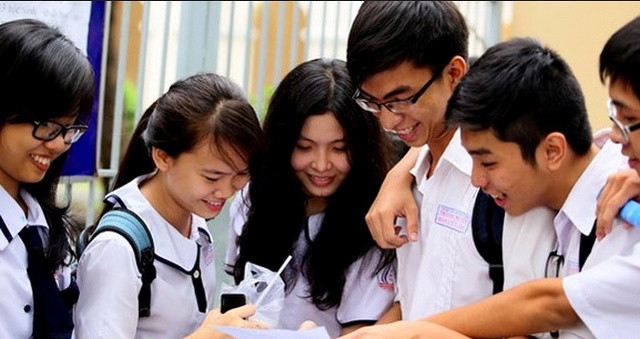University entrance exam 2017: 'Tips' to get high score in Civic Education
For the first time, Civic Education has become a subject for both high school graduation and college admissions, causing many students to worry.
Avoid learning by rote or by bias
With 40 objective multiple choice questions of Civic Education (GDCD), each question has 4 answer options and only 1 correct answer option. Overall, the sample test has questions at basic levels, serving the purpose of considering high school graduation recognition (recognition: 40%, understanding: 20%) and differentiated questions (low-level application: 30%, high-level application: 10%) serving the purpose of university and college admission. This test requires that in order to achieve the goal of entering university and college, students must have a solid grasp of knowledge, especially knowledge to do differentiated questions.
 |
| Understanding the problem and knowing how to apply it will help you do well on the Civics exam. Photo: Internet. |
According to many teachers, with the way Civic Education subjects are set up like the sample exam of the Ministry of Education and Training, teachers and students must change their teaching and learning methods. Because the content of the multiple choice exam is included in all the lessons in the 12th grade program "Citizenship and the Law". If you memorize, study skewedly, and focus on one lesson and neglect another, it may lead to bad results.
Specifically, teachers and students will have to innovate teaching and learning methods in a more positive direction: Applying the content of the lesson knowledge to solving problems of social life appropriate to the age group will only solve 40% of the application questions. During the learning process, students need to develop critical thinking skills, analysis and synthesis skills, assessment skills, problem-solving skills, and civic responsibility skills... in accordance with the teaching requirements in the direction of developing students' competencies.
Minh Anh, a 12th grade student at Yen Hoa High School (Hanoi) shared: “I only registered for one social science combination (History, Geography, Civic Education) to focus on the best review. If it is an essay-based test, just reviewing by topic is fine, but if it is a multiple-choice test, the knowledge must be broad and comprehensive. Civic Education is a subject related to life, so it is very close, and the teachers also easily understand the responsibilities of citizens. For Civic Education this year, the multiple-choice test is multiple-choice, so the learning method is different from before. It involves exercises to solve real-life situations, so students must know how to analyze and evaluate. The teachers have created review sets to help us practice our reflexes, making it easier to handle multiple-choice tests.”
According to Ms. Nguyen Luong Thien, a Civic Education teacher at Dinh Tien Hoang High School (Hanoi), this is the first time the subject has been tested multiple-choice, so teachers are struggling because they have no experience. In previous years, students only had to learn basic, core knowledge, but now the program has 9 lessons, so students have to learn everything. Not only that, they have to go deep, do each knowledge content thoroughly and apply it to many different situations, so it is quite difficult. Because the knowledge content is spread out, students have to systematize all the knowledge, avoiding the situation of rote learning and lopsided learning.
Understand the problem and know how to apply it
According to an education expert, the sample test published by the Ministry is good but its application is limited. Therefore, it is necessary to add questions from real-life situations to the test for students. Only then can we contribute to radically changing the way this subject is taught and learned, helping students learn not only for the test but also to apply it in real life.
To do well in the Civic Education exam, first of all, you must have a firm grasp of the basic knowledge of the textbook, focusing on the lesson content related to real life, issues related to the rights and obligations of citizens. A teacher said that it is not necessary for students to memorize every concept in the textbook, just understand the problem and know how to apply it to do well on the test. Regarding the method, students need to pay attention to read the questions carefully, because often the differentiation questions will fall into the case of handling situations and there is usually not much difference between the answers. If they just skim through, students may make unnecessary mistakes.
However, you need to note that it is not necessary to memorize everything because in reality it is impossible to memorize all the laws and constitutions. Many teachers have pointed out some "tips" for candidates, such as: for situational questions, if you do not know how to handle them, you should handle them from an ethical perspective. The law has a foundation in ethics, many people follow the law not because they really understand the law but because their behavior is in accordance with ethical standards. Put yourself in the position of the victim, usually the right solution is the solution that is in accordance with the majority of society.
Students should read a lot of information in books and newspapers to support their missing legal knowledge. In particular, grasp the knowledge about the forms of using the law with groups such as: Can do, must do and cannot do. Grasp and emphasize important phrases, for example, when talking about violations of the law, there are many forms of violations, such as administrative violations, civil violations... to avoid confusing the answers./.
According to VOV
| RELATED NEWS |
|---|


